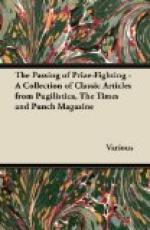Like many another Chief Secretary before him, Mr. IAN MACPHERSON, who reappeared in the House after a long absence in Ireland, had to figure with a scourge in one hand and an olive branch in the other. At Question-time he was the stern upholder of law and order, obliged within the last few days to suspend a seditious newspaper and to surround the Dublin Mansion House with soldiers. A few moments later he was moving the Second Reading of a most generous Housing Bill, under which Irish Corporations will be enabled to build thousands of dwellings largely at the expense of the general taxpayer.
[Illustration: FAILING TO DIFFER.
SIR EDWARD CARSON AND MR. DEVLIN.]
In his warm welcome to the measure Sir EDWARD CARSON revealed a side of his character not often seen, except by his personal friends. He was so sympathetic to the needs of the Irish working-classes, so eloquent upon the benefits to health, sobriety and contentment that good houses would secure, and so insistent upon the necessity of making the new dwellings beautiful as well as useful, that Mr. DEVLIN could do little more than say “ditto to Mr. BURKE.”
Wednesday, May 16th.—Those persons, at home and abroad, who persist in regarding the British as universal land-grabbers will please note that Spitsbergen, despite the undoubted fact that an Englishman landed there three centuries ago, leaves us cold. Although no direct response was made to Mr. ASHLEY’S suggestion that the future of the island should be referred to the Coal Commission, it is widely felt that if Mr. SMILLIE and Sir LEO CHIOZZA MONEY would volunteer to explore its possibilities they would be doing the country signal service.
The drawbacks of having the Leadership of the Opposition in commission were further exemplified when Sir DONALD MACLEAN in his most impressive manner asked for a day to discuss Lord FRENCH’S communications to the Press. Mr. BONAR LAW inquired if he desired to move a Vote of Censure in his capacity as Leader of the Opposition. “No, no,” shouted the supporters of the rival claimants, Mr. ADAMSON and Mr. GEORGE LAMBERT. Whereupon Sir DONALD altered his tone and mildly observed that he only wanted to clear up a constitutional point.
The debate on Mr. HARTSHORN’S motion regarding the state of Ireland was unique of its kind in that not a single Member representing an Irish constituency took the floor; but in spite of that it produced more heat than light. Both the mover and the seconder (Mr. SEXTON) were rich in denunciation of the present Government of Ireland, but poverty-stricken in suggestions for its improvement. Lord HENRY BENTINCK seized the opportunity to make final recantation of his Unionist principles, but in default of more practical proposals was reduced to imploring the people of Ulster “to show some spirit of compromise;” and Lord HUGH CECIL in a despairing moment declared that he would sooner see three-fourths of Ireland independent than the whole of it presented with a form of Home Rule which no Irishman desired. After that one appreciated Sir KEITH ERASER’S remark, that during four years’ soldiering in Ireland he had only met one man who understood the Irish Question, and he was an Englishman who had only been there a week!




